
The United States Supreme Court will hear a case pitting a pair of Georgia Gwinnett College students against campus administrators. At issue is whether it is legal to confine free speech on public campuses to so-called “free speech” zones. These zones are often minuscule and clearly meant to send the message that campuses will only tolerate free speech if forced to do so. In addition, Gwinnett College also imposed an onerous permitting and application process.
The plaintiff, Chike Uzuegbunam, wished to preach Christian evangelism. But similar issues have appeared whenever a student or group of students wish to announce opinions–conservative, liberal, religious, or secular–that college administrators wish to suppress.
University administrators have sought to terminate or subject professors to “investigations,” for example, for demonstrating incorrect views on antiracism – even about issues as obscure as music theory. Universities have also removed faculty for correctly instructing students about misconstruing racist connotations in Chinese words.
Case Background
In July 2016, Chike Uzuegbunam (a junior at the time) passed out pamphlets sharing his faith in a public plaza of Gwinnett College in Lawrenceville, Georgia. A college official approached him and stopped him, stating school policy required him to ask permission to speak at least three days in advance, and that he was limited to two areas on campus, considered “free speech expression” areas.
Uzuegbunam then went through the permit process, but campus police told him he would not be allowed to speak even in the free speech zone. This was because someone issued a complaint.
A Gwinnett College speech code, since withdrawn by the school, said students could be found guilty of disorderly conduct if they engage in public speech that “disturbs the peace and/or comfort” of citizens. This means that anyone who is “uncomfortable” about what someone else says is entitled to file a complaint, and it’s clear that the college administration will then muzzle the offending student—however harmless the would-be speaker may be.
Given the nature of the complaint, Uzuegbunam believed college officials simply didn’t like what he was saying, and as such used these policies to silence him.
Uzuegbunam filed a lawsuit in U.S. District Court in Atlanta against the college, arguing a violation of his First Amendment rights. Joseph Bradford, another student who had wished to preach on campus, also joined the case.
The Cost of Silencing Students?
Uzuegbunam is different from many free speech cases that result in lawsuits against universities.
Many students and faculty have been forced to protect themselves from overzealous administrators when they are expelled or fired due to viewpoints that others find “uncomfortable” on campus or which administrators simply want to suppress. In those cases, the loss of employment or education inflicts a clear, tangible, and costly damage to the plaintiff. It ruins their careers.
In Uzuegbunam the student was only prevented from preaching, which he did voluntarily and without compensation. He had a hard time explaining what monetary loss he had suffered.
This was important because the federal judge dismissed the suit in 2018, saying that once Gwinnett revised its policy and Uzuegbunam grauduated, all legal issues had been rendered moot. There were no real damages that might keep the case alive, despite the plaintiff’s request for nominal damages.
The Court of Appeals for the 11th Circuit upheld this ruling in 2019.
The 11th Circuit pointed out that Uzuegbunam might have argued that he suffered concrete financial losses, however small, because the college forced him to lose time and money traveling to campus to speak (in vain) as well as reputational harm and personal humiliation at the hands of College officials. Yet Uzuegbunam had not made any such arguments to the court.
This was, arguably, an extremely technical reason to dismiss the would-be student preacher’s claim. The 11th Circuit’s decision turns on the technicalities of federal pleading standards and what specific kinds of damages render a constitutional rights complaint moot and what kind of damages do not.
The Supreme Court Will Reassess the Case
The Supreme Court has now agreed to hear the case.
The students’ legal team says the college must still be held responsible for having enacted and enforced policies that imposed barriers against students’ free speech rights.
They also argue that the dismissal of his case makes Uzuegbunam appear to be in the wrong, when in fact the reason the case was dismissed had nothing to do with the actual events of the case in question. From the students’ perspective, the university having since changed its policies is irrelevant.
The Supreme Court has not yet set a date for when it will hear the case. Whatever its decision, Uzuegbunam will become an important case determining the contours of free speech on public college campuses.
For more information about upholding free speech rights on campus, contact an experienced attorney at Allen Law today.